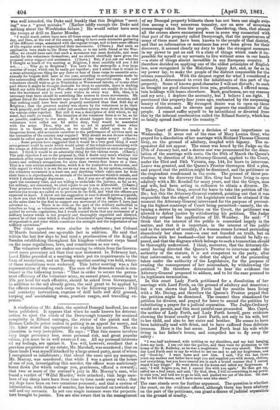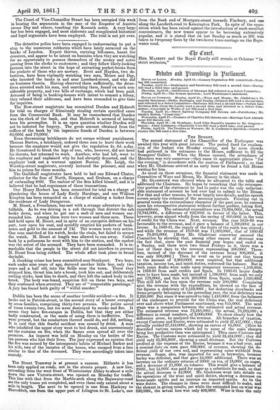The Court of Divorce made a decision of some importance
on Wednesday. It arose out of the case of Mary Louisa Gray, who prayed for a dissolution of her marriage with Richard Thomas Clement Gray, on the ground of adultery, coupled with bigamy. The re- spondent did not appear. The cause was heard by the Judge on the 17th of January last, and a decree nisi was pronounced for the disso- lution of the marriage with costs. On the 20th of March the Queen's Proctor, by direction of the Attorney-General, applied to the Court, under the 23rd and 24th Victoria, cap. 144, for leave to intervene. Leave was granted, and the Queen's Proctor thereupon filed a plea, and prayed that the petition might be dismissed, and the petitioner or the respondent condemned in the costs. The ground of these pro- ceedings was the discovery that Mrs. Gray had been living in open adultery with a Mr. Kendall for many years, and that the Grays, man and wife, had been acting in collusion to obtain a divorce. Dr. Wamhey, for Mrs. Gray, moved for leave to take the petition off the file; but this the Attorney-General resisted, pointing out that it was impossible that the object of the Legislature could be attained if the moment the Attorney-General intervened for the purpose of prevent- ing the highest contempt of Court being permitted—namely, the ob- taining a decree by an imposition on the Court, the petitioner was allowed to defeat justice by withdrawing his petition, The Judge Ordinary refused the application of Dr. Wambey. He said: " think that the interest of the public is concerned largely in the matter, and that it is important, in the interest of the public and in the interest of morality, if a woman comes forward pretending shamelessly her sham case—a case not founded on truth, but on collusion with her husband—that her conduct should be fully ex- posed, and that the disgrace which belongs to such a transaction should be thoroughly understood. I think, moreover, that the Attorney-Ge- neral having directed the Queen's Proctor to intervene under the authority of the statute, it is not competent to the party, after that intervention, to seek to defeat the object of the proceeding taken under the authority of the Legislature, for the purpose of evading the consequences of her misconduct, by withdrawing the petition." He therefore determined to hear the evidence the Attorney-General proposed to adduce, and to let the case proceed to- its legitimate termination. In this court Lady Forth petitioned for a dissolution of her-• marriage with Lord Forth, on the ground of adultery and desertion; but it was shown that Lady Forth had for months been living with a Mr. Dering, and therefore the Queen's Proctor prayed that the petition might be dismissed. The counsel then abandoned the petition for divorce, and prayed for leave to amend the petition by substituting a prayer for a judicial separation. The Judge-Ordinary would not permit, and this most painful case proceeded. Mrs. Cape], the mother of Lady Forth, and Lady Forth herself, gave evidence showing the brutal cruelty of Lord Forth, not only to his wife, but to her child, and also to her sister and brother. He seems to have been habitually mad with drink, and to have suffered from delirium tremens. Here is the last scene. Lord Forth beat his wife while living in her father's house, and compelled her to fly away for
:
"I was half undressed, with nothing on my shoulders, and my hair banging down my back. I ran out into the garden, and then went for protection to the house of Sir R. Bulkeley, as he was a magistrate. I was very unwell. The next day Lord Forth sent to say he wished to see me and to ask my forgiveness, and say Good-by.' I went home and saw him. I said, 'Fur the last three years my mother and father have kept you and supplied you with money clothes, and everything, but you have treated me in such a brutal manner that I cannot stand it any longer.' He went down on his knees and asked my forgiveness. said, I will forgive you, but I cannot live with you again.' He then got up, called me a foul name, and said, By God, then, I will do everything in my power to ruin you,' and told me to go to hell, and pushed me out of the door. On that day he left the house, and I have never seen him since."
The case stands over for further argument. The question is whether the court, on the evidence offered, although there has been adultery on the part of the petitioner, can grant a decree of judicial separation on the ground of cruelty.
The Court of Vice-Chancellor Stuart has been occupied this week in hearing the arguments in the case of the Emperor of Austria versus Day and others, touching the Kossuth notes. A very large bar has been engaged, and most elaborate and complicated historical and legal arguments have been employed. The trial is not yet over.































 Previous page
Previous page